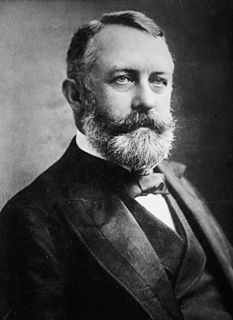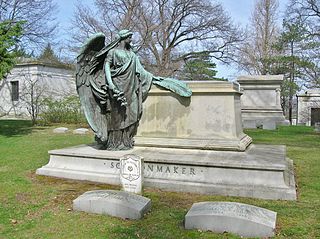Related Research Articles

Pinkerton, founded as the Pinkerton National Detective Agency, is a private security guard and detective agency established in the United States by Scotsman Allan Pinkerton in the 1850s and currently a subsidiary of Securitas AB. Pinkerton became famous when he claimed to have foiled a plot to assassinate president-elect Abraham Lincoln, who later hired Pinkerton agents for his personal security during the Civil War. Pinkerton's agents performed services ranging from security guarding to private military contracting work. The Pinkerton National Detective Agency hired women and minorities from its founding, a practice uncommon at the time, as they were useful as spies. Pinkerton was the largest private law enforcement organization in the world at the height of its power.

The Homestead strike, also known as the Homestead steel strike, Homestead massacre, or Battle of Homestead was an industrial lockout and strike which began on July 1, 1892, culminating in a battle between strikers and private security agents on July 6, 1892. The battle was a pivotal event in U.S. labor history. The dispute occurred at the Homestead Steel Works in the Pittsburgh area town of Homestead, Pennsylvania, between the Amalgamated Association of Iron and Steel Workers and the Carnegie Steel Company. The final result was a major defeat for the union of strikers and a setback for their efforts to unionize steelworkers.

Henry Clay Frick was an American industrialist, financier, and art patron. He founded the H. C. Frick & Company coke manufacturing company, was chairman of the Carnegie Steel Company, and played a major role in the formation of the giant U.S. Steel manufacturing concern. He also financed the construction of the Pennsylvania Railroad and the Reading Company, and had extensive real estate holdings in Pittsburgh and throughout the state of Pennsylvania. He later built the historic neoclassical Frick Mansion, and upon his death donated his extensive collection of old master paintings and fine furniture to create the celebrated Frick Collection and art museum. However, as a founding member of the South Fork Fishing and Hunting Club, he was also in large part responsible for the alterations to the South Fork Dam that caused its failure, leading to the catastrophic Johnstown Flood. His vehement opposition to unions also caused violent conflict, most notably in the Homestead Strike.

Homewood Cemetery is a historic urban cemetery in Pittsburgh, Pennsylvania, United States. It is located in Point Breeze and is bordered by Frick Park, the neighborhood of Squirrel Hill, and the smaller Smithfield Cemetery.

Frederick John Osterling was an American architect, practicing in Pittsburgh from 1888.

Richard Phelan, D.D. was an Irish-born prelate of the Roman Catholic Church who served as the fourth bishop of the Diocese of Pittsburgh, Pennsylvania, in the United States from 1889 to 1904.

Clifford Wesley "Tacks" Latimer was an American professional baseball catcher who played in Major League Baseball for the New York Giants, Louisville Colonels, Pittsburgh Pirates, Baltimore Orioles, and Brooklyn Superbas from 1898 to 1902. Including the years he played only in the minor leagues or as a semi-professional, Latimer's career ranged from 1895 to 1908.
The Allegheny County District Attorney is the elected district attorney for Pittsburgh and Allegheny County, Pennsylvania. The office is responsible for the prosecution of violations of Pennsylvania commonwealth laws.. The current District Attorney is Stephen Zappala.

The Pittsburgh Police Chief is an American law enforcement official who serves as the head of the Pittsburgh Bureau of Police, appointed by the Mayor of Pittsburgh. The Chief is a civilian administrator, and was historically referred to as the Police Superintendent as well as Chief, both titles having the same authority and meaning.
James Slusser was a longtime Pittsburgh police leader who served as Pittsburgh Police Chief from August 13, 1952-January 5, 1970. He joined the force in 1941.
The following is a timeline of the history of the city of Pittsburgh, Pennsylvania, US.
The Greater Pittsburgh Chamber of Commerce is a Pittsburgh area non-profit that promotes business and community development throughout Southwestern Pennsylvania.

The 1906 Western University of Pennsylvania football team was an American football team that represented Western University of Pennsylvania as an independent during the 1906 college football season.
The 1903 Western University of Pennsylvania football team was an American football team that represented Western University of Pennsylvania as an independent during the 1903 college football season.

The 1901 Western University of Pennsylvania football team was an American football team that represented Western University of Pennsylvania as an independent during the 1901 college football season.
The 1902 Western University of Pennsylvania football team was an American football team that represented Western University of Pennsylvania as an independent during the 1902 college football season. The Pitt Football Record Book refers to a 24–0 victory over Bucknell. However, contemporary press coverage indicates that the game was played between Bucknell and a team known as "the Pittsburgh stars".

The 1900 Western University of Pennsylvania football team was an American football team that represented Western University of Pennsylvania as an independent during the 1900 college football season.

The 1899 Western University of Pennsylvania football team was an American football team that represented Western University of Pennsylvania as an independent during the 1899 college football season.

The 1898 Western University of Pennsylvania football team was an American football team that represented the Western University of Pennsylvania as an independent during the 1898 college football season.

The Westinghouse Interworks Railway was a short line railroad that operated in the lower Turtle Creek valley east of Pittsburgh, Pennsylvania. A subsidiary of the Westinghouse Electric Corporation, the railway used former Turtle Creek Valley Railroad tracks that Westinghouse rebuilt and extended from Trafford through Wilmerding to East Pittsburgh along the right bank of the creek. The railroad transported freight between the Westinghouse plants and also tested and demonstrated electric rail cars.
References
- 1 2 3 4 "John P. M'Tighe Has Passed Away". The Pittsburgh Post. July 16, 1906. p. 2 – via Newspapers.com.
- 1 2 3 Center, Legislativate Data Processing. "JOHN P. McTIGHE". The official website for the Pennsylvania General Assembly.
- ↑ "Request Rejected".
- ↑ "'Ripper' Bill Becomes Law". The San Francisco Call. March 18, 1906. p. 36 – via California Digital Newspaper Collection.
- ↑ "Boss' Brother Has Been Able to Make Plenty of Trouble". The Pittsburg Press. March 5, 1903. p. 2 – via Google News Archive.
- ↑ "Wallace Makes Rapid Strides". The Pittsburg Press. April 1, 1904. p. 11 – via Google News Archive.
- ↑ "M'Tighe and Moore Fight". The Pittsburg Press. July 19, 1903. p. 1 – via Google News Archive.